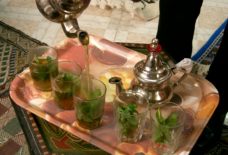A Taste of Sudan
BY: David DeMaria/Contributing Writer
Sudan has been the subject of constant negative media attention over the years. War, genocide, and famine have been the most trending subjects from the African nation. Even people who have followed Sudan’s political, ethnic, and religious turmoil most intently, may be unfamiliar with the tasty cuisines that come from the country.
One of the main staples of Sudanese cuisine is a popular fermented bread called Kisra (كسرة). There are two different kinds of Kisra, both made from dura (ذرة) (sorghum) or wheat. One is a thin baked sheet, similar to Ethiopian Injera, referred to as kisra rhaheeefa. The other version of the dish is known as kisra aseeda (كسرة عصيدة), and is typically paired with a meat and vegetable stew, such as the popular dish Mullah (مولاح). Another typical Sudanese bread is Gurassa (قراصة), and is often eaten with a steak dish, tomatoes, onions, cardamom, and cinnamon, called Dama (دامة).
Sudanese meals often consist of appetizers, such as Elmaraara (مرارة) or Umfitit (أم فتفت), which are both made from sheep lung, liver, or stomach. Sudan even has its own cheese called, Gibna Bayda (جبنة بيضة) or white cheese, that can be used in salads such as Salaat Jazar (سلطة الجزر) or carrot salad, Salaat Zabidi (سلطة الزبادي) or yogurt salad, which is made from a variety of vegetables and poured into yogurt.
Sudanese cuisine features stews such as Mullah and Waika (ويكهة), which use Ni’aimiya (نعيميه), a spice mix with dried okra (بامية مجففة). Sharmout Abiyad (شرموط أبيض) is made from dried meat, onions, and dried okra. Stews are typically eaten with a sorghum porridge Asseeda Dukhun (عصيدة دخن). A green plant called Mouloukhiya (مولوخية) is often added to the Asseeda.
Desserts include Ajwa (عجوة), which is a cookie dipped in sugar and stuffed with dates. Peanuts can also be used to create delicious macaroons such as Ful Sudani (فول سوداني).
As far as beverages are concerned, the Sudanese are known for several drinks made from local fruits, such as Tabaldi (تبلدي), which is a seed-filled fruit that comes from the Baobab tree (شجرة الباوباب), Aradaib (عرديب) or tamarind, Karkadai (كركديه) a sweet hibiscus tea, and Guddaim (قضيم) which is a tiny red berry from the grewia plant. During Ramadan, other beverages are consumed. One of these Hilumur (حلو مر), which is made from corn flower and spices. Other popular drinks during Ramadan include Aabrai Abiyad (أبري أبيض) and Nashaa (نشا) which are also made from corn flower.
Alcohol is prohibited in Sudan, as it is currently governed by Sharia law, but that doesn’t inhibit some Sudanese people from imbibing an alcoholic gin made from dates called Araqi (عرقي), which is illegally brewed in defiance of Sharia law.
The national dish of Sudan is Ful Medames (فول مدمس) which is a simple, but yet flavorful blend of cooked fava beans, vegetable oil, and cumin. It is often embellished with parsley, garlic, onion, lemon juice, chili peppers, vegetables, herbs, and spices. Though it is the national dish of Sudan, it is also consumed by other countries throughout the Arab World and East Africa, most notably Egypt.
A variation of this dish is shahan (شاهان فول), which is made by slowly cooking lava beans in water until soft, and crushed into a thick paste. It is often consumed with chopped green onions tomatoes, hot green peppers, and sometimes yogurt, feta cheese, olive oil, lemon juice, cumin, and chili pepper. Like Ful Medames, it is an export of Sudan, but is widely consumed in other countries in Africa, such as Egypt, Eritrea, and Ethiopia.
Sudan is a country that has suffered a lot recently. It has even been split into two countries, Sudan and South Sudan, a divide based on ethnic and religious conflict. Though it has been surrounded by turmoil, its cuisine offers a diverse variety of flavors. It is the type of food that often takes a long time to prepare, but is abundant with flavor and nourishing to the body. Perhaps Sudanese cuisine, with its taste and delicacy, can help heal old wounds, and help to inspire positive change for the future.









